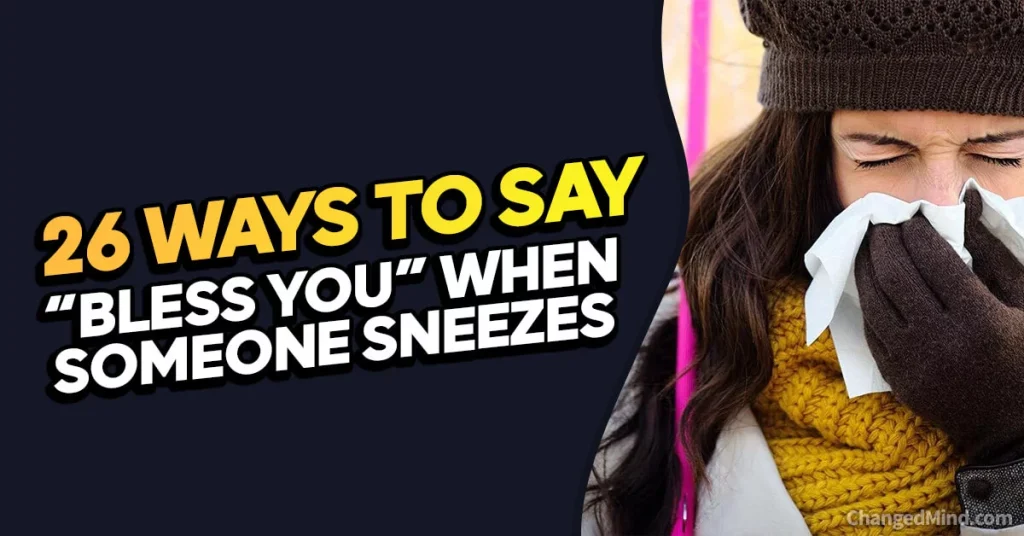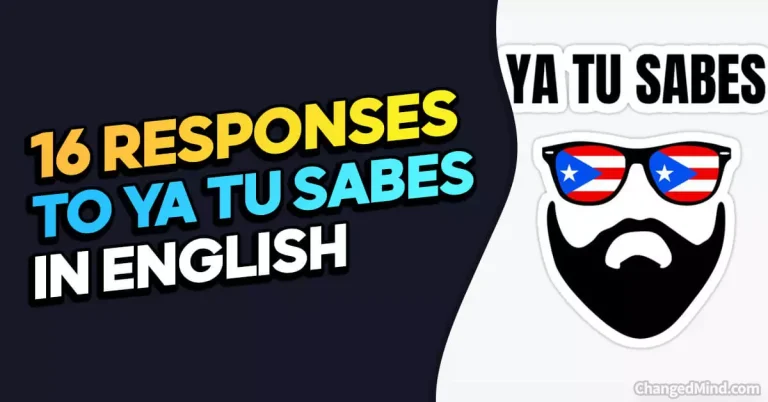Ah, the age-old “Bless You” after a sneeze—almost as automatic as saying “Hello” when answering the phone, right? But what if we told you that the world of sneeze responses is far more colorful and intriguing than a simple “Bless You”?
In this article, we’re about to embark on a journey that will tickle your funny bone and expand your sneeze-vocabulary horizons.
We’ve gathered 26 playful alternatives to the traditional response, from the comically whimsical to the elegantly unexpected.
So, if you’re ready to add a dash of humor and flair to your sneeze etiquette, keep reading, because “Other Ways to Say ‘Bless You’ When Someone Sneezes” is here to make your sneezing encounters a whole lot more entertaining.
In this article, we’ll explore:
- Playful sneeze responses for a lighthearted touch.
- Creative alternatives to add humor and charm.
- Elegant and unexpected ways to respond.
- Cultural insights on sneeze etiquette around the world.
Get ready to upgrade your sneeze-game with style and a hearty laugh! Let’s dive into the wonderful world of sneeze responses.
The practice of saying “Bless You” after a sneeze dates back centuries and has both religious and cultural significance. It is believed to have originated from the belief that a sneeze could potentially expel evil spirits or cause the soul to temporarily leave the body.
However, there are various other ways to respond when someone sneezes depending on cultural customs and personal preferences. Here are some alternative phrases you can use instead of “Bless You”:
- Gesundheit: A German expression meaning “good health.”
- Salud: A Spanish word that translates to “health.”
- Sneeze Well: A playful and light-hearted response.
- God Bless You: A more traditional and religious alternative.
- Health and Happiness: Wishing good health and happiness.
- Live Long and Prosper: Inspired by the famous phrase from Star Trek.
- Take Care: A simple and sincere way to express concern.
- Cover Your Mouth: A friendly reminder for good hygiene.
- Kazoos: A humorous and lighthearted response.
- Best Wishes: Extending well wishes for the person who sneezed.
Cultural and regional variations exist in the way people respond to a sneeze. For example, in some cultures, people may respond with a different phrase or simply acknowledge the sneeze with a nod or smile.

It is important to be aware of these variations and respect cultural customs when responding to a sneeze. The etiquette around responding to a sneeze can differ depending on the setting.
While a simple “Bless You” may be appropriate in casual settings, formal occasions may call for a more subdued or formal response.
Ultimately, the purpose is to show concern and acknowledge the person who sneezed, so choose a phrase that feels authentic and considerate in each situation.
Key takeaways:
- Saying “Gesundheit” is a common alternative to “Bless you” when someone sneezes, and it means “health” in German.
- Another alternative is “Salud,” which means “health” in Spanish, and is commonly used in Spanish-speaking countries.
- Using “God Bless You” as an alternative is a more traditional and religious way to acknowledge someone’s sneeze.
The Meaning Behind Saying “Bless You” When Someone Sneezes
When someone sneezes, it is customary in many cultures to say “bless you” or the equivalent. The origins of this practice can be traced back to ancient times. One theory suggests that it originated in ancient Rome, where sneezing was believed to expel evil spirits from the body. Saying “bless you” was a way to protect the person from these spirits.
Another theory suggests that it was a way to wish the person good health, as sneezing was seen as a sign of illness. Over time, this saying has become a social norm, a polite gesture to acknowledge someone’s sneeze and show concern.
True story: A couple of years ago, I was waiting in line at a grocery store when someone in front of me sneezed. Without thinking, I automatically said “bless you.” To my surprise, the person turned around, smiled, and said, “Thank you, that was very kind of you.”
It was a small moment of connection and a reminder of how a simple phrase can bring people together, even in the most unexpected places.
What Are the Origins of Saying “Bless You”?
The saying “Bless You” when someone sneezes has ancient origins dating back to Rome during the 6th century. It is linked to the Bubonic Plague or Black Death, a deadly plague that was spreading at that time. Sneezing was believed to be an early symptom of this disease.
Thus, individuals would utter the words “God bless you” as a prayer for the individual’s well-being and protection from the illness.
Another belief suggests that sneezing could momentarily expel the soul from the body, making it susceptible to evil spirits. To prevent this, people started saying “Bless You” to anchor the soul in its place and safeguard the person from harm.
Through the passage of time, this tradition has transformed into a social politeness and a way to express concern for another person’s health. Although its origins stem from superstition and health concerns, saying “Bless You” nowadays is considered a courteous response to someone sneezing.
Another great resource for understanding the different ways to say “Bless You” when someone sneezes can be found in the Other Ways to Say “Bless You” When Someone Sneezes article on Wikipedia.
Hence, the next time you witness someone sneezing, bear in mind the centuries-old tradition associated with saying “Bless You”.
Other Ways to Say “Bless You”
Looking for alternative ways to acknowledge sneezes? Look no further! In this section, we’ll explore a variety of creative and lighthearted alternatives to the traditional “bless you.”
From the classic “gesundheit” to the lively “sneeze well” and even the whimsical “kazoos,” we’ve got you covered.
So, the next time someone sneezes, let’s bring some laughter, good health, and unique expressions into the mix. Get ready to discover a whole new world of sneeze acknowledgments!
1. Gesundheit
Gesundheit is a German expression commonly used in Germany and understood in other parts of the world to wish someone good health after they sneeze. The word “Gesundheit” translates to “health” in English. This response reflects the cultural variations in saying “bless you” after a sneeze.
In German-speaking countries, Gesundheit is the most common response to a sneeze. It is a polite and respectful way to acknowledge someone’s sneeze and wish them well.
Here’s an example of a table showcasing cultural and regional variations in saying “bless you” after a sneeze:
| Language | Expression | Meaning |
|---|---|---|
| German | Gesundheit | Wishing good health |
| French | À tes souhaits | To your wishes |
| Spanish | Salud | Health |
| Italian | Salute | Health |
| Russian | Будь здоров | Be healthy |
| Japanese | 大丈夫ですか (Daijōbu desu ka) | Are you alright? |
| Arabic | عافاك الله (Aafak Allah) | May God cure you |
Gesundheit is a widely recognized term used to wish someone good health after they sneeze, particularly in German-speaking countries. Different cultures and regions have their own unique expressions for this purpose. It’s always interesting to learn about these cultural variations and respond accordingly when someone sneezes.
2. Salud
When someone sneezes, saying “Salud” is a common way to offer well wishes. This phrase, “Salud,” which means “health” in Spanish, is used in many Spanish-speaking countries as a polite response to a sneeze.
It is believed that the phrase originated from the superstition that a sneeze could potentially cause the soul to leave the body, and saying “Salud” was a way to protect the person from any harm.
In addition to “Salud,” there are various other ways to respond to a sneeze, such as “Bless you” in English or “Gesundheit” in German. These responses are meant to convey good wishes for the person who sneezed.
Pro-tip: When in a multicultural setting, it is always thoughtful to be aware of different cultural customs and respond appropriately when someone sneezes. By using phrases like “Salud,” you can show respect and understanding for different traditions and brighten someone’s day with good wishes.
3. Sneeze Well
If you want to ensure a healthy and considerate response when someone sneezes, follow these steps to “sneeze well”:
- Cover your mouth and nose with a tissue or your elbow to prevent the spread of germs.
- Dispose of the tissue properly in a trash can or wash your hands immediately if you used your elbow.
- If you’re in a public place, try to move away from others while sneezing to minimize the risk of spreading germs.
- Wash your hands thoroughly with soap and water for at least 20 seconds after sneezing.
- If soap and water are not available, use hand sanitizer with at least 60% alcohol content.
- Avoid touching your face, especially your eyes, nose, and mouth, to prevent the transfer of germs.
- Practice good respiratory hygiene by sneezing into a tissue or your elbow even if you don’t have any symptoms.
- If you have frequent or severe sneezing, consult a healthcare professional to rule out any underlying allergies or conditions.
Sneeze Well
If you want to ensure a healthy and considerate response when someone sneezes, it is important to “sneeze well”.
- Cover your mouth and nose with a tissue or your elbow to prevent the spread of germs.
- Dispose of the tissue properly in a trash can or wash your hands immediately if you used your elbow.
- If you’re in a public place, try to move away from others while sneezing to minimize the risk of spreading germs.
- Wash your hands thoroughly with soap and water for at least 20 seconds after sneezing.
- If soap and water are not available, use hand sanitizer with at least 60% alcohol content.
- Avoid touching your face, especially your eyes, nose, and mouth, to prevent the transfer of germs.
- Practice good respiratory hygiene by sneezing into a tissue or your elbow even if you don’t have any symptoms.
- If you have frequent or severe sneezing, consult a healthcare professional to rule out any underlying allergies or conditions.
4. God Bless You
“God bless you” is a widely used phrase in response to someone sneezing. This common expression originates from religious beliefs and is believed to have originated during the bubonic plague in Rome.
At that time, sneezing was considered a symptom of the plague, which led people to say “God bless you” in order to wish the sneezer good health and protection from the deadly disease.
Although this phrase carries religious connotations, it has now become a part of secular contexts as well. It is considered a polite way to acknowledge someone’s sneeze and show concern for their well-being. Uttering “God bless you” is also seen as a simple act of expressing basic human kindness and goodwill towards others.
Aside from the phrase “God bless you,” there are various other responses to a sneeze, such as “Gesundheit,” “Salud,” or simply “Bless you.” The specific phrases used may vary depending on cultural and regional customs.
Additional interesting fact: In certain cultures, it is believed that when one sneezes, their soul momentarily leaves their body. Saying “God bless you” is thought to offer protection against evil spirits attempting to enter the body during that vulnerable moment.
5. Health and Happiness
To express good wishes for someone’s well-being, there are various ways to say “bless you” when someone sneezes.
One of these expressions is “health and happiness,” which conveys a desire for the person’s overall well-being and brings a sense of warmth to their heart. Here are some other ways to convey similar sentiments:
- Gesundheit: A German word meaning “good health.”
- Salud: A Spanish word meaning “health.”
- Sneeze Well: Encouraging the person to have a healthy and successful sneeze.
- God Bless You: A traditional phrase invoking blessings from a higher power and wishing the person health and happiness.
- Live Long and Prosper: Wishing the person a long and prosperous life filled with health and happiness.
- Take Care: Expressing a concern for the person’s well-being and wishing them both health and happiness.
- Cover Your Mouth: Encouraging good hygiene practices during a sneeze to ensure the person’s health and well-being.
- Kazoos: A humorous and lighthearted way to acknowledge the sneeze and bring some health and happiness into the moment.
- Best Wishes: Offering well-wishes for the person’s overall happiness and success, encompassing both health and happiness.
These expressions vary across different cultures and regions, showcasing the diversity in how people convey good wishes during a sneeze. Regardless of the expression used, it is a gesture of goodwill towards the individual.
Next time someone sneezes, whether you opt for “health and happiness” or any of the other expressions, may your words bring a smile to their face and a sense of warmth to their heart.
6. Live Long and Prosper
- Live Long and Prosper: This phrase, famously popularized by the beloved character Mr. Spock from the iconic TV show “Star Trek,” is not only a greeting but also a unique way to respond when someone sneezes.
In addition to saying “Bless You,” there are numerous other ways to acknowledge someone’s sneeze:
- Gesundheit: In English-speaking countries, this German word meaning “good health” is often used as a response.
- Salud: Spanish-speaking countries commonly use this Spanish word, which translates to “health,” as a reply to a sneeze.
- Sneeze Well: This lighthearted response wishes the person good health and a speedy recovery from their sneeze.
- God Bless You: A traditional response that invokes a blessing from a higher power upon the person who sneezed.
- Health and Happiness: This response conveys well-wishes for both good health and happiness to the sneezer.
- Live Long and Prosper: As previously mentioned, this renowned phrase borrowed from “Star Trek” expresses the desire for the individual to lead a lengthy and prosperous life.
- Take Care: By expressing concern, this response shows genuine care for the well-being of the person who sneezed.
- Cover Your Mouth: A humorous reminder to practice good hygiene and cover one’s mouth when sneezing.
- Kazoos: This playful response suggests using a kazoo as a way to drown out the sound of the sneeze, adding a fun element.
- Best Wishes: A general response that conveys good wishes and desires for the well-being of the person who sneezed.
Fun Fact: Did you know that the record for the longest sneezing fit is 978 days? Donna Griffiths from the UK holds this extraordinary record. Fortunately, most sneezes are significantly shorter and less disruptive!
7. Take Care
When someone sneezes, it is customary to respond with a polite phrase like “bless you.” There are various alternative ways to express the same sentiment. Here are 10 different ways to respond when someone sneezes:
- Gesundheit – A German phrase meaning “good health”
- Salud – The Spanish word for “health”
- Sneeze Well – A playful response wishing the person good health after sneezing
- God Bless You – An expression invoking divine blessings
- Health and Happiness – Wishing the person both good health and happiness
- Live Long and Prosper – A reference to the saying from Star Trek, wishing the person a long and successful life
- Take Care – An expression emphasizing the importance of caring for oneself
- Cover Your Mouth – A reminder of hygiene and good manners
- Kazoos – A whimsical response that doesn’t have a specific meaning
- Best Wishes – General well-wishes for the person
These variations in responding to sneezes reflect different cultural and regional customs. From invoking blessings to emphasizing good health, each phrase carries its own significance. So, next time someone sneezes, feel free to use one of these alternative ways to respond!
Saying “Take Care” when someone sneezes originated during the time of the Bubonic Plague in the 14th century. As a precautionary measure, people started saying “take care” after a sneeze to remind others to stay safe and avoid the spread of the disease. This phrase has remained as a subtle reminder to prioritize personal health and well-being.
8. Cover Your Mouth
When it comes to responding to a sneeze, it is crucial to remember to “Cover Your Mouth.”
This phrase is commonly used in order to emphasize the importance of etiquette in preventing the spread of germs and potential infections.
By covering your mouth while sneezing, you can effectively hinder the transmission of bacteria or viruses. It is highly recommended to use a tissue or, even better, the crook of your elbow to cover your mouth.
This is because using your hand may lead to contact with surfaces or objects that others may come in contact with.
Furthermore, it is essential to properly dispose of the tissue after use. By incorporating this simple habit into your routine, you will significantly contribute to the creation of a healthier and more hygienic environment for both yourself and those around you.
9. Kazoos
- When someone sneezes, there are various ways to respond besides saying “bless you.” One unique and less common response is mentioning kazoos.
- Here is a list of alternative responses to saying “bless you” when someone sneezes:
- Gesundheit
- Salud
- Sneeze Well
- God Bless You
- Health and Happiness
- Live Long and Prosper
- Take Care
- Cover Your Mouth
- Kazoos
- Best Wishes
While “kazoo” might seem unrelated to sneezes, it adds a touch of humor and lightness to the situation. Note that the use of “kazoos” as a response to sneezing varies widely, and it may not be commonly recognized or understood by everyone. It is essential to consider the cultural and regional context when using these alternative responses.
10. Best Wishes
When it comes to offering well wishes after someone sneezes, there are various ways to express your sentiments aside from saying “Bless You.” Here are ten alternatives:
- Gesundheit
- Salud
- Sneeze Well
- God Bless You
- Health and Happiness
- Live Long and Prosper
- Take Care
- Cover Your Mouth
- Kazoos
- Best Wishes
Each of these phrases carries a different tone and cultural connotation, allowing you to choose the one that best suits your personal style and relationship with the person who sneezed. Whether you opt for a traditional or more lighthearted response, remember that the intention behind the gesture is what matters most. So, next time someone sneezes, consider offering your best wishes in a unique and thoughtful way!
Cultural and Regional Variations in Saying “Bless You”
When someone sneezes, saying “bless you” is a common response in many cultures. There are fascinating cultural and regional variations in how people acknowledge a sneeze.
In English-speaking countries, the phrase “bless you” is widely used to respond to a sneeze. However, in Germany, people say “gesundheit,” which means “good health,” and in France, they say “à tes souhaits,” which translates to “to your wishes.” Similarly, in Spain, the customary response is “¡Salud!“, which conveys the meaning “health.”
Interestingly, in certain Asian countries like Japan and China, it is customary not to say anything in response to a sneeze. In contrast, in India, phrases such as “live long” or “God bless you” are commonly used.
These different expressions of acknowledging a sneeze reflect the diverse cultural practices and beliefs around the world. Exploring these variations not only broadens our knowledge but also enables us to appreciate the values they represent.
Instead of simply saying “bless you,” one can also demonstrate cultural awareness and appreciation by using phrases like “salud,” “gesundheit,” or “à tes souhaits.”
Etiquette Around Responding to a Sneeze in Different Settings
In various settings, there are different etiquettes to consider when responding to a sneeze.
Here are some instances:
1. Etiquette in formal settings: In formal environments such as business meetings or conferences, the ideal approach is to acknowledge the sneeze with a gracious phrase like “Bless you” or “Gesundheit.” Make sure to keep the response brief and respectful.
2. Etiquette in informal settings: In casual settings like among friends or family, a more relaxed approach can be adopted. You can use humorous responses such as “You’re so good-looking,””Cover your mouth next time,” or simply say “Bless you.”
3. Cultural considerations: It is crucial to be mindful of cultural differences while responding to a sneeze. In certain cultures, like in Japan, it is customary not to respond at all to avoid drawing attention.
Conducting research on local customs can help prevent any unintended offense. Remember, regardless of the setting, it is always considered polite to show concern for the person who sneezed. Be mindful of their comfort and respond appropriately.
Some Facts About Other Ways to Say “Bless You” When Someone Sneezes:
- ✅ Saying “Gesundheit” is a common response to sneezing in German.
- ✅ In Spanish, different responses like “salud” (health), “dinero” (money), and “amor” (love) are used for the first three sneezes.
- ✅ The French response to a sneeze is “à tes/vos souhaits,” which means “to your wishes.”
- ✅ In Dutch, the response is “gezondheid” (health) for the first sneeze and “morgen mooi weer” (good weather tomorrow) for the third sneeze.
- ✅ Turkish responses to sneezes include “çok yaşa” (live long) for the first sneeze and “sağlıklı yaşa” (live healthy) for the second sneeze.
Frequently Asked Questions
What are some other ways to say “bless you” when someone sneezes in different languages?
In Slavic languages like Russian, the response is “будьте здоровы” (be healthy). In Albanian, you can say “Shëndet” (health), “Faleminderit” (thank you), or “Shëndet paç” (may you have health). In Turkish, you can say “çok yaşa” (live long) or “sağlıklı yaşa” (live healthy). In French, the response is “à tes/vos souhaits” (to your wishes). In Dutch, you can say “gezondheid” (health) or “morgen mooi weer” (good weather tomorrow).






